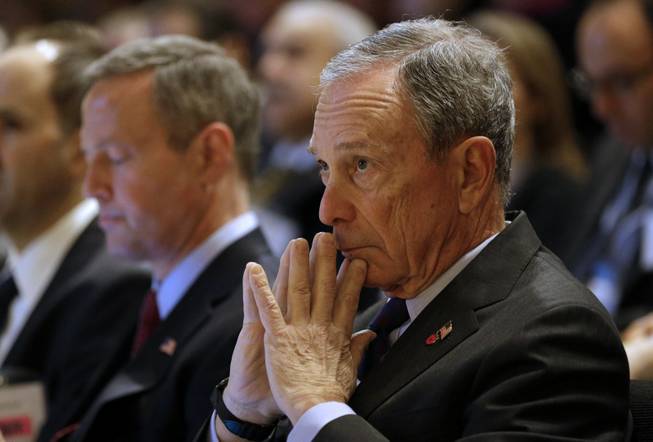
Patrick Semansky / AP
New York City Mayor Michael Bloomberg waits to speak at a gun violence summit at Johns Hopkins Bloomberg School of Public Health in Baltimore, Monday, Jan. 14, 2013, where he outlined his proposals for federal gun control reforms. Sitting alongside Bloomberg is Maryland Gov. Martin O’Malley. Bloomberg urged President Barack Obama and Congress to increase background check requirements for firearms purchases, and also said the federal government needs to get tougher on gun trafficking.
Tuesday, Feb. 19, 2013 | 4:04 p.m.
CHICAGO — New York City Mayor Michael Bloomberg waded deeper Tuesday into the Chicago-area election to replace former Rep. Jesse Jackson Jr., defending his super PAC's $2 million in anti-gun ads attacking a former congresswoman and candidate in the race.
Gun control has emerged as a main issue on the campaign trail, and television commercials and mailers paid for by Bloomberg's super PAC, Independence USA, have been brought up in candidate forums, news conferences and biting emails from the 20 candidates who'll appear on the Feb. 26 primary ballot.
The ads focused on two Democrats, former U.S. Rep. Debbie Halvorson and state Sen. Toi Hutchinson, who have had high ratings from the National Rifle Association. Then Hutchinson unexpectedly dropped out of the race last week and put her support behind another Democrat front-runner, former state Rep. Robin Kelly, who supports an assault weapons ban. Halvorson, who doesn't support a ban, has since accused Bloomberg of trying to "buy an election" and colluding with Kelly.
Bloomberg, a vocal advocate of strict gun control, said his concern is beefing up gun laws and said — without naming a candidate — that the NRA has convinced lawmakers that they can't win without the organization's support.
"It's just an outrage, and the public ... should stand up," he told reporters in New York. "I'm part of the public. I happen to have some money, and that's what I'm going to do with my money — try to get us some sensible gun laws."
It's not surprising for the Democrat-turned-Republican-turned-independent to take such a vocal stance on guns: He's the co-chair of Mayors Against Illegal Guns and has spoken widely on the issue. But singling out one race on the issue is a bit more unusual, and the action has drawn attention since it's mid-cycle.
Bloomberg launched his super PAC weeks before the November election and spent more than $12 million to back seven candidates nationwide. Guns were an issue in the election of newly-elected Rep. Gloria Negrete McLeod, a California Democrat who ousted incumbent Democrat Rep. Joe Baca with Bloomberg's help. However, Bloomberg's backing hasn't always equaled success. His super PAC supported former Rep. Robert Dold, R-Ill., who lost to a Democratic businessman, Rep. Brad Schneider.
Bloomberg said there wasn't anything in particular about the Illinois race that prompted his involvement, aside from attention to gun violence.
Halvorson — who favors universal background checks and strict gun registrations but not an assault weapons ban — and other candidates said they didn't buy it.
"He's trying to buy a seat in Congress is what he's trying to do," she said.
Halvorson, Chicago Alderman Anthony Beale and others said the super PAC money had compromised the election. Halvorson wants a Federal Election Commission investigation. FEC officials said Tuesday they hadn't received a complaint.
Guns became a main topic early in the race in Illinois' 2nd District, which spans dense neighborhoods on Chicago's South Side, some south suburbs and more rural areas. The territory is largely Democratic, meaning the Democratic winner of next week's primary is most likely headed to Washington.
Kelly has gained momentum with key endorsements in recent days. She dismissed any notions of working with Bloomberg, which is prohibited. Super PACs are allowed to give unlimited money, but it's illegal to coordinate with candidates.
However, her opponents have blasted her campaign since Hutchinson abruptly left the race days before the election, which Halvorson called "bizarre."
Jackson, who first won the seat in 1995, resigned in November, citing his health and acknowledging he was under federal investigation. Federal prosecutors charged him last week with conspiracy for allegedly spending campaign money on personal expenses. He's agreed to plead guilty.
